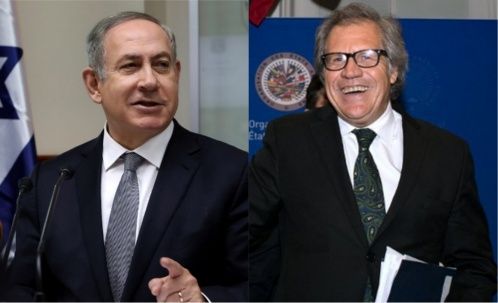Blasting Venezuela's "dictatorship," Organization of American States head Luis Almagro called Israel an "essential partner — due to its commitment to democracy and human rights."

Secretary-General of the Organization of American States Luis Almagro used his one-day visit to Israel to condemn Venezuela's leftist government while expressing “pride that Israel is a friend of the Americas,” praising what he called Tel Aviv's record of respecting human rights and democracy.
The tour seemed less like the diplomacy of a “supra-president” representing the Western Hemisphere, and more like a roadshow for the OAS chief to reiterate Trump administration talking points.
RELATED:
OAS Appoints Former ICC Prosecutor Ocampo to Look Into Venezuela 'Crimes Against Humanity'
"As friends, Israel and the Americas share key values such as democracy and human rights. We have opportunities to learn from each other," he told a gathering of World Jewish Congress members in Jerusalem. Despite Tel Aviv's globally unrecognized claims that the ancient city is its “national capital,” Jerusalem remains under illegal occupation.
The themes of democracy and human rights were repeated multiple times by the secretary-general during his time with Israeli officials, usually in such contexts as “Israeli … our essential partner in the Middle East — due to its commitment to democracy and to human rights.”
Israeli authorities face routine criticism from world legal bodies like the U.N. for their disregard of human rights standards, especially in their discriminatory treatment of the Palestinian population.
“Israel is a democratic state in which the institutions function,” Almagro told Haaretz. “The functionality of institutions and the balance of powers are fundamental for us and are the paradigm of the health of a democracy.”
Israeli institutions systematically deny the people of Palestine their right to self-determination, imposing stringent restrictions on their movement, travel, and trade. Israeli security forces have been criticized by rights organizations for resorting to excessive force, including extrajudicial killings, on a regular basis, while unarmed Palestinian demonstrators — adults and children — face imprisonment, torture, and abuse for taking part in protests against occupation activities. The construction of massive settlements deep in the occupied West Bank likewise is illegal under international law.
Almagro's tone jars dramatically with his opinion five years ago as foreign minister of Uruguay, admitting in an interview that he voted on U.N. resolutions condemning Israeli settlements and human rights violations “with both hands” while arguing that the Israeli occupation's crimes were irrefutable from a legal standpoint.

On the subject of Venezuela, Almagro struck an emphatic tone consistent with his prior calls to remove the country's government through "regime change" efforts.
ANALYSIS:
Lenin's Imperialism in the 21st Century
“It is a dictatorship, there’s no other definition for Venezuela today,” Almagro told Israeli daily Haaretz.
Seemingly oblivious to the irony in his words, he then condemned the left for having “flinched on democracy and human rights” in the South American nation.
Opining about U.S. unilateral sanctions on Venezuela, Almagro said, “no country feels comfortable in this situation … but that does not mean the sanctions don’t hit hard and hit those specific places that most affect the regime.”
Since becoming secretary-general of the OAS, Almagro has become a partisan of Venezuela's right-wing opposition, railing against alleged abuses by the “ruling regime” and issuing thousands of tweets against the Bolivarian government, accompanied by calls for foreign intervention in the country.
In contrast, Almagro has been relatively silent in respect to the Western Hemisphere's most pressing human rights crises — such as the Mexican government's crackdowns on social movements resisting neoliberal structural reforms, assassinations of social movement leaders and paramilitary attacks on rural and Indigenous communities throughout Latin America, and the parliamentary coup against Brazilian President Dilma Rousseff.
The OAS chief's contradictory messages underscore Bolivian President Evo Morales' description of Almagro's "submission to the North American empire."